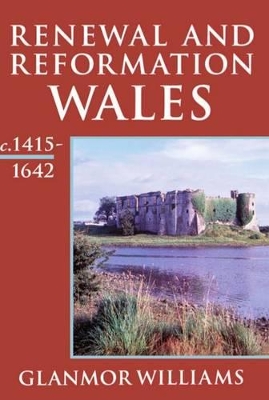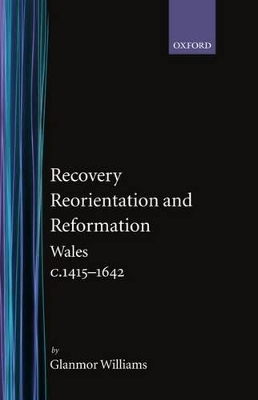History of Wales
2 primary works
Book 3
This is the first comprehensive history of the two decisive centuries which followed the defeat of Owain Glyndwr in 1415. The fifteenth century was a time of resilience and recovery from the Rebellion, and one which saw the emergence of ruling gentry families, whose power, and that of the monarchy, was confirmed by the Tudor Act of Union, 1536-43.
This was an age of outstanding personalities and achievements as impressive as they were diverse: Owain Glyndwr, Henry Tudor, John Dee, Robert Devereux, William Morgan, Matthew Gough, and Robert Mansell. Throughout, the Welsh remained prouder and more conscious of their national identity than has usually been thought.
This was an age of outstanding personalities and achievements as impressive as they were diverse: Owain Glyndwr, Henry Tudor, John Dee, Robert Devereux, William Morgan, Matthew Gough, and Robert Mansell. Throughout, the Welsh remained prouder and more conscious of their national identity than has usually been thought.
Book 3
This is the first comprehensive account of the two decisive centuries in Welsh history which followed the defeat of Owain Glyn Dwr in 1415. In the process, surprising features emerge. The fifteenth century, the `Cinderella' of Welsh history, is seen as one of resilience and recovery from the protracted and destructive Glyn Dwr rebellion, and of the emergence of ruling gentry families, natives and settlers.
The Tudor Act of Union in 1536-43 swept away the outmoded lumber of medieval times and reorientated the country. It confirmed strikingly royal authority and gentry domination but along lines that had long been anticipated. The Renaissance and the Reformation posed not only perils but opportunities. Responding to the challenge with vigour and imagination, Welsh scholars and patriots met with marked,if not complete, success. The Welsh remained prouder and more conscious of their Welshness than
has usually been thought. This was an age of outstanding personalities and achievements, as impressive as they were diverse: Owain Glyn Dwr and Henry Tudor; Guto'r Glyn and John Dee; William Herbert and Robert Devereux; Sion Cent and William Morgan; Mathew Gough and Robert Mansel.
Particular attention is given to the literature of the age, Welsh and English, prose and verse, to illustrate all aspects of a robust, colourful, and formative era.
The Tudor Act of Union in 1536-43 swept away the outmoded lumber of medieval times and reorientated the country. It confirmed strikingly royal authority and gentry domination but along lines that had long been anticipated. The Renaissance and the Reformation posed not only perils but opportunities. Responding to the challenge with vigour and imagination, Welsh scholars and patriots met with marked,if not complete, success. The Welsh remained prouder and more conscious of their Welshness than
has usually been thought. This was an age of outstanding personalities and achievements, as impressive as they were diverse: Owain Glyn Dwr and Henry Tudor; Guto'r Glyn and John Dee; William Herbert and Robert Devereux; Sion Cent and William Morgan; Mathew Gough and Robert Mansel.
Particular attention is given to the literature of the age, Welsh and English, prose and verse, to illustrate all aspects of a robust, colourful, and formative era.

